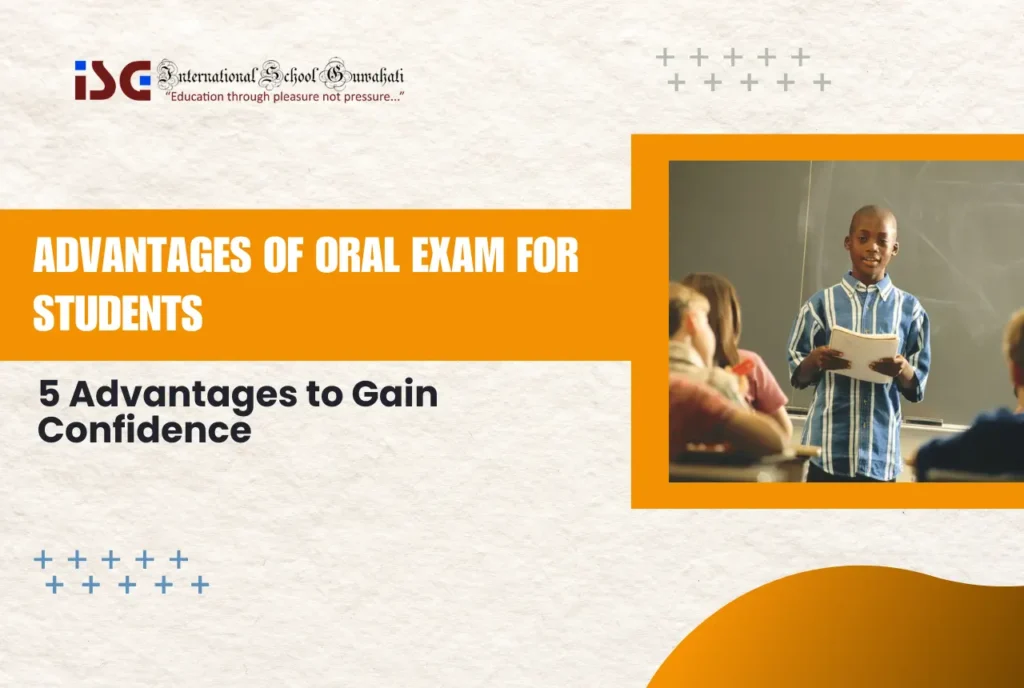Although written assessments scare students all the same but not like oral assessments. According to a study, more than 72% of students are terrified of it or any other kind of public speaking. This is because they lack confidence; be it a student or any other professional. Therefore, in this blog, we will walk you through the advantages of oral exam for students and how to be better at them.
Oral tests and exams have been used for a long time. As part of a larger testing plan, a well-designed oral exam can be very helpful for both the student and the person giving the test. This teaching tip will talk about those pros and cons, and then it will end with some things you should think about if you want to use oral assessments in your class.
What are Oral Examinations?

In an oral assessment or examination, most of the time, students are given topics or questions for an oral test ahead of time that cover a set of course outcomes. The student can take the oral exam in person, on Zoom, or by recording a timed video. During the exam, the student is randomly given one to two questions and has to explain or respond within the time limit.
5 Amazing Advantages of Oral Exam for Students
Boosts Confidence in Students

Oral exams are majorly feared by students because they lack confidence. This exercise helps build confidence in students as it involves speaking up during the test.
- Students learn how to verbally frame answers to the questions on the spot and this boosts their self-confidence.
- Framing answers on the spot can also help boost their memory skills.
Encourages Better Learning Techniques and Outcomes
When it comes to speaking out verbally, one of the main benefits of oral presentations in education is that students always try to remember or learn the subject matter in different individualistic ways that suit them.
- Students often tend to make personalized studying techniques for exams. This facilitates personalized education which is more effective and impactful.
- These techniques in turn help achieve different academic goals and outcomes for students.
Enhances Communication Skills

Most students don’t have much practice speaking in front of others in their field. Adding casual as well as formal chances to talk in class and short presentation tasks with time for feedback and discussion can help immensely.
- Speaking up often and scoring for speaking well can build confidence in carrying out effective communication.
- Presentation or viva voice also prepares students for future careers in the corporate industry.
Promotes Higher Order Thinking and Problem-Solving Skills
Learning how to answer problems is a big part of learning about STEM subjects. A lot of written tests only use short questions so that students who get stuck don’t get too much of a grade.
When students take an oral test, on the other hand, the teachers can help them through any problems and give them more chances to practice and show how well they can solve problems. An oral test is better than a written exam because of this. It is also more thorough.
Personalized Interaction Reduces Test Anxiety
One of the most significant advantages of oral exams for students is that it reduces test anxiety in them in the long run and personalized interaction helps dilute some of that.
It was also seen that students focused more on understanding the concept and less on memorization when it came to oral assessments. Thus, oral examinations help students in a number of ways.
The Real-Life Use Angle
Teaching the necessary verbal communication skills for an oral evaluation will likely have broader applications outside of the classroom.
Most vocations necessitate some form of verbal communication skills. Having the ability to select your words carefully is extremely valuable, whether it is at a job interview to secure a position while negotiating commercial agreements, when communicating with patients, or when encouraging teams. Therefore, let us equip them with the necessary abilities to successfully navigate the actual world.
Oral Exam vs. Written Exams

Traditionally, written examinations have been the primary method of assessment in educational settings. However, oral examinations provide a helpful option. Let us examine the advantages and disadvantages of each option:
Written Examinations:
- Advantages: The standardized style of the test guarantees fairness, provides students with sufficient time to organize their thoughts and alleviates test anxiety for some individuals.
- Drawbacks: May prioritize individuals with high test-taking abilities rather than those with a profound comprehension, and have little capacity to evaluate critical thinking or communication aptitude.
Oral Examinations:
- Advantages: Assesses a student’s proficiency in articulating ideas, promotes analytical thinking through conversation, and accommodates kids with strong verbal skills.
- Drawbacks: Grading might be influenced by subjective factors, exam anxiety may be heightened, and time constraints can impede performance.
An optimal strategy frequently integrates both methods. Written assessments evaluate fundamental information, whereas oral examinations probe more extensively, unveiling a student’s genuine comprehension of the subject matter. This comprehensive approach offers a more comprehensive understanding of a student’s learning.
In the end, the decision relies on the specific goals of the learning process. Through the deliberate integration of both verbal and written evaluations, educators can guarantee a comprehensive assessment of their students’ aptitudes and deficiencies.
How to be Better at Oral Examinations?

Different students have different approaches to examinations; be they oral or written. Here are some tips that might help you be better at oral assessments.
- Remain calm and composed.
- To alleviate anxiety, it is crucial to establish a strong framework and engage in ample rehearsal since these factors significantly contribute to bolstering self-assurance.
- Before starting, breathe deeply.
- Maintain consistent and effective eye contact.
- Avoid studying for it right before the exam, it is important to reflect in that time period.
Takeaway
There are many advantages of oral exams for students regardless of where they are in their academic journey. Unfortunately, students are absolutely terrified of attempting oral examinations because it involves direct interaction with the examiner. More than 70% of students report having an unusual fear of public speaking or just speaking to their teachers for that matter.








